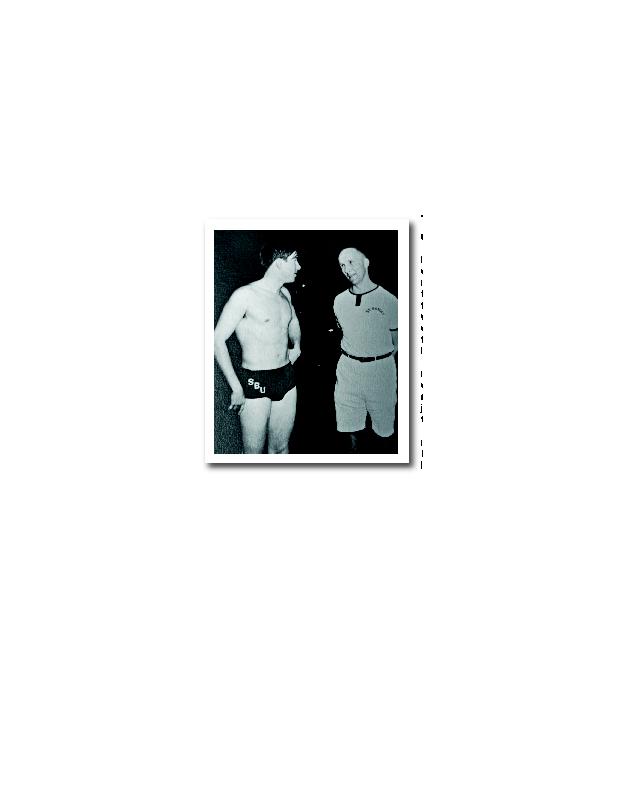
Malek and Fr. Gervase (White) I credit for the success I have
father was right: I was immature and needed the discipline."
Margaret Bryner, who worked under Skehan for 10 years in the
ers, and however he did it, they were going to come out better for
it. ... If he felt they could do something, he was going to ask it of
them and push them to do it."
just tough. There was no gray matter
with him, only black and white. He
created a very respected team in the
East -- with no scholarship swimmers
-- because of the way he ran the
program.
kids (eight), and he'd go to bat for his
guys. Even when the swim season
was over, I'd walk through Butler to
his office just to talk to him."
summer swim program, on a hilltop
in rural Cattaraugus County. High-
profile college coaching colleagues
would often visit camp to bounce
ideas off each other.
swim coach for more than 30 years.
"He read voraciously all the time, and
never feared meeting people with bet-
ter ideas and stealing what they did.
So many coaches in that era just did (as coaches) what they were
told to do when they were athletes. He was always looking for more
and better."
row. He was the link to our dad."
"My sister and brother-in-law Joe stepped in to help raise us
ence on me," Kevin said. "They were academics at Ithaca and
helped me understand the importance of education."
Tempesta basement.
ing as an escape valve to give my mom a break. You can imagine
the pressure on a widow with two young teens and a small boy."
very close to the boys because he's always been there for them.
They were great kids. We were just there to help guide them along,
to keep them focused on a direction in their lives."
"Zero," he said. "But Skehan pulled me into his office and said,
knew I needed some discipline. I showed up the first day of practice
and four years later I was the captain. I was totally sucked into
coaching. A light bulb went on and I just really started to identify
all about."
who we are.' That really resonated with
me," Kevin said. "The family legacy, my fa-
ther's name ... everywhere at St. Bonaven-
ture everyone told me how great my dad
was, what a principled individual he was,
what a straight shooter and wonderful fa-
ther. It all just kind of came together when
I heard that from Fr. Brian."
with the men's swim program and leg-
endary coach "Doc" Counsilman, who had
just coached the 1976 U.S. Olympic swim
team.
Kevin thought he was in trouble. Instead,
Dr. Clinton Strong handed him a reference
which Strong had never seen.
before. It wasn't his way. He was always about challenging you,
being tough and in your face. ... The gist was that I'd never let Indi-
ana down, and I'd never let St. Bonaventure down, that I came from
a solid-stock family, that I saw my limits and blew through them."
Notre Dame in the winter of 1977. Skehan told Kevin he was retir-
ing as swim coach.
played the family card," Kevin said. "Next thing I knew, I was at the
airport in Indianapolis talking to (athletic director) Larry Weise."
mic shift in college sports, especially in the East as traditional inde-
pendent powers began to align in conferences like the Big East and
Eastern 8 (renamed the Atlantic 10 in 1982).
practices were "like going to Parris Island."